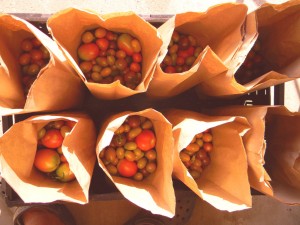By Hans Hansen, Blackwood Land’s Head Horticulturist
Mushroom compost. Yes or no?
I’ve been asked this question at least 5 times in the last year so I figured it was time for a bit of due diligence, to bring myself up to date. The last review I did on mushroom compost, over 10 years ago, left me with a with a “I’ll definitely pass” answer.
Industry methods change over time, there is a lean toward biological methods because of public demand for pesticide free food and because of pathogen and pest resistance to pesticides.
After bringing myself up to date, reviewing several studies, current mushroom production methods, as well as reviewing common information sources (i.e. Wikipedia), this is what I came up with.
In sum: If you are an organic gardener, don’t have access to mushroom compost from an Organic Certified mushroom producer (or don’t know your mushroom farmer, his / her methods), then only use it on turf, at most.

Delicious tomatoes separated for farmer’s market drop.
But if you do anyway.
Key things to consider / ask about available mushroom compost (a detailed chemical analysis might be available from the mushroom producer or vendor): 1) Chemical analysis – ask for one– some vendors have them. 2) Pesticide residue – Is there any? The analysis will not likely tell you unless it’s organic. 3) High calcium – does your soil need it? Mushroom compost has a nice dose of it. If you are low in calcium, high calcium could be a plus. 3) High compost pH – it varies though mushroom compost has a reputation of being on the high side, though some have a neutral pH. It varies by product. Again, maybe your soil can use a higher pH? 4) Magnesium – does your soil need it? Calcium and magnesium are good if balanced, and in the right amounts. 5) Soluble salts – concentrations are higher in mushroom compost than most other materials used to increase soil organic matter. High salt levels are not good for seed germination, sensitive veggies.
When you are in an intensive soil build phase, yearly soil tests are very useful. They keep mistakes in check (prevent nutrient surpluses) that can be difficult to correct. Relying on any single composted material is going to alter your nutrient profile over time.
Links and References
Spent mushroom compost
https://en.wikipedia.org/wiki/Spent_mushroom_compost
Analysis of Fresh Mushroom Compost
https://horttech.ashspublications.org/content/20/2/449.full.pdf
WHY I DON’T RECOMMEND MUSHROOM COMPOST
https://www.douggreensgarden.com/mushroom-compost.html
We’d love to hear from you.
Have you tried mushroom compost before? What were your results? Do you have any other resources to add?

